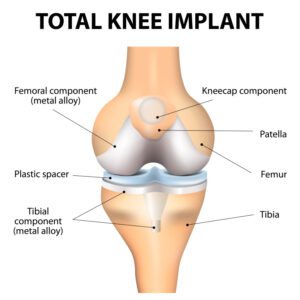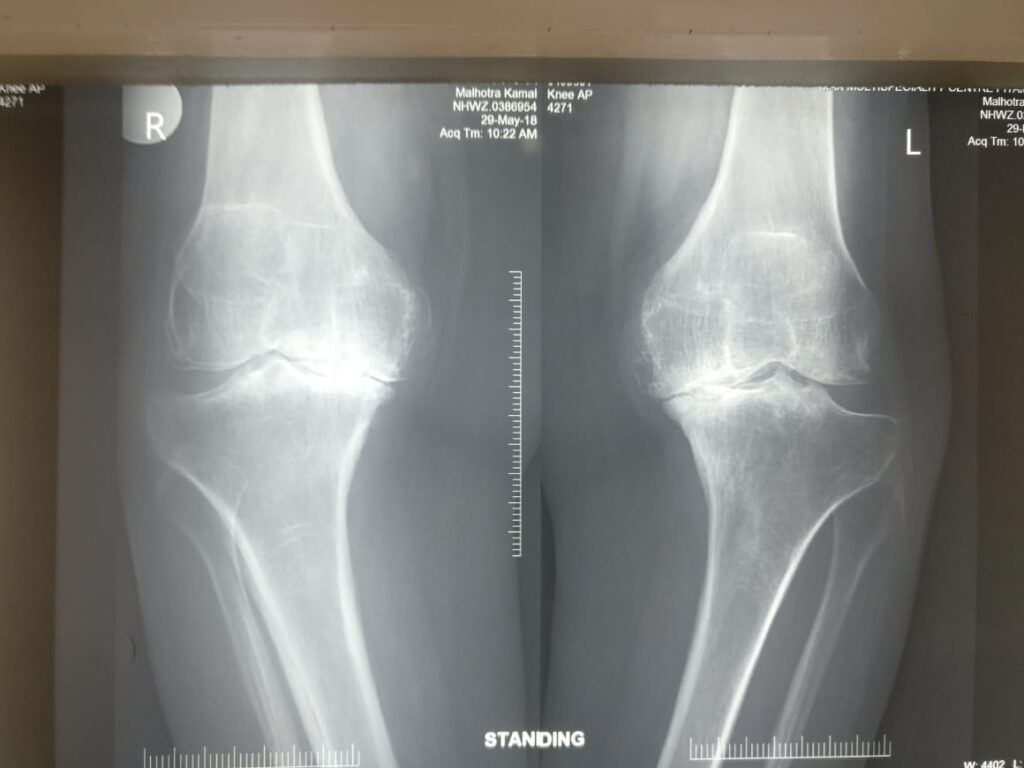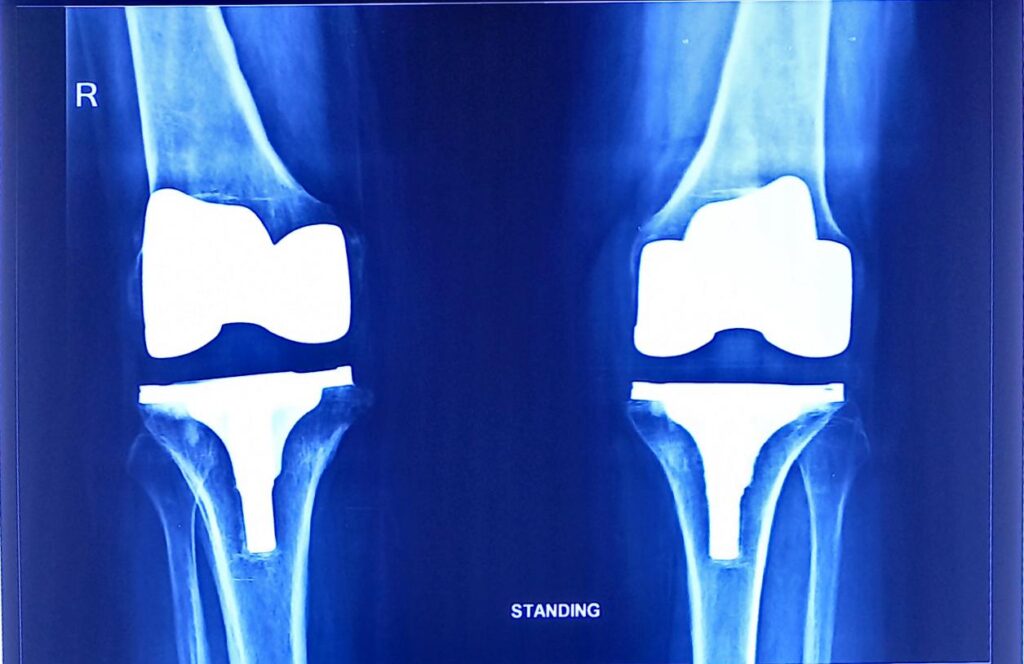Total Knee Replacement Surgeon
Knee pain caused by degenerative disease, injury, or wear and tear can severely limit mobility and hinder daily activities. When non-surgical treatments like medication, therapy, or injections fail to provide relief, Total Knee Replacement Surgery (TKR) becomes a reliable and effective solution. Performed by Dr. Biren Nadkarni, a leading orthopedic surgeon in Delhi with over 20 years of experience, TKR restores mobility and alleviates pain, allowing patients to regain their quality of life.

Prevalence of Total Knee Replacement in India
In India, knee osteoarthritis is a prevalent condition, with an estimated prevalence of 22-39% in individuals over 60 years old. As a result, TKR is becoming an increasingly common surgical procedure in the country. According to the National Health Profile 2020, the number of TKR procedures performed in India increased from 25,215 in 2014-15 to 43,905 in 2018-19, showing a growth rate of 13.22%. The highest number of TKR surgeries are performed in the age group of 60-69 years.
Before TKR

After TKR

What is Total Knee Replacement Surgery?
Total Knee Replacement Surgery involves replacing the damaged or diseased surfaces of the knee joint with artificial components, commonly known as implants. These implants mimic the natural movement of the knee, relieving pain and restoring function.
The procedure is typically recommended for individuals suffering from:
- Severe osteoarthritis or RA.
- Knee deformities such as bowlegs or knock-knees.
- Traumatic knee injuries.
- Persistent pain and stiffness that limit mobility.
Why Are Patients Opting for Total Knee Replacement?
Statistics show that TKR is one of the most successful surgical procedures for improving mobility and reducing pain:
- Over 90% of patients report significant pain relief and improved mobility after surgery.
- 1 in 20 individuals globally undergo knee replacement due to severe degenrative disease by the age of 60.
- With advancements in surgical techniques, the success rate for TKR exceeds 95%.
Who is a Candidate for Total Knee Replacement Surgery?
Total Knee Replacement (TKR) surgery is typically recommended for individuals who experience severe knee pain and functional limitations that cannot be managed with non-surgical treatments. You may be a candidate for TKR if:
- Severe Osteoarthritis or RA: Chronic joint pain and stiffness due to advanced degenerative disease that interferes with daily activities.
- Persistent Pain: Knee pain that persists even at rest and significantly impacts sleep and quality of life.
- Limited Mobility: Difficulty walking, climbing stairs, or performing simple tasks due to reduced range of motion.
- Deformities in the Knee: Conditions like bowlegs or knock-knees that contribute to joint damage and instability.
- Ineffectiveness of Non-Surgical Treatments: Failure of medications, physical therapy, or injections to alleviate pain and improve function.
- Overall Health and Fitness: Candidates must be in good general health to undergo surgery and participate in post-operative rehabilitation.
Dr. Biren Nadkarni thoroughly evaluates each patient’s condition, medical history, and lifestyle needs to determine if TKR is the right solution. This personalized approach ensures the best outcomes and a higher quality of life for his patients.
Cost of Total Knee Replacement Surgery in Delhi
The cost of TKR surgery in Delhi ranges between ₹2.0 lakhs to ₹4.5 lakhs, depending on factors such as:
- Hospital facilities.
- Type of implant used.
- Complexity of the surgery.
- While cost is a consideration, patients should also evaluate the long-term benefits, such as reduced pain, improved mobility, and enhanced quality of life.
Traditional Total Knee Replacement vs. Robotic-Assisted TKR
While traditional knee replacement is a proven method, robotic-assisted knee replacement offers enhanced precision and faster recovery.
Traditional TKR:
- Manual Alignment: Surgeon uses manual instruments for bone cutting and implant placement.
- Longer Recovery: Recovery may take slightly longer due to higher tissue disruption.
Robotic-Assisted TKR:
- Enhanced Precision: Robotic systems ensure accurate implant positioning, reducing wear and improving longevity.
- Minimally Invasive: Smaller incisions result in faster recovery and less post-operative pain.
Dr. Nadkarni is experienced in both traditional and robotic-assisted techniques, ensuring the best approach tailored to each patient’s needs.
Why Choose Dr. Biren Nadkarni for TKR Surgery?
With over 20 years of experience, Dr. Biren Nadkarni is one of Delhi’s most trusted orthopedic surgeons. Key reasons to choose him include:
- Expertise in Traditional and Robotic-Assisted TKR: Ensures precision and optimal results.
- High Success Rate: Over 95% of patients achieve pain-free mobility.
- Personalized Care: Each patient receives a tailored treatment plan based on their unique condition.
- State-of-the-Art Facilities: Surgeries are performed at leading hospitals like Sitaram Bhartia Institute Hospital, Holy Family Hospital, and Apollo Spectra Hospital.
Advantages and Disadvantages of Total Knee Replacement
Advantages:
- Pain Relief: Significant reduction or complete elimination of knee pain.
- Improved Mobility: Enhanced range of motion and restored knee function.
- Durability: High-quality implants can last 15-20 years or more with proper care.
- Improved Quality of Life: Patients can resume daily activities and low-impact exercises.
Disadvantages:
- Surgical Risks: Like any surgery, TKR involves risks such as infection, blood clots, or implant failure.
- Recovery Time: Full recovery can take 3-6 months.
- Implant Lifespan: Although durable, implants may require revision surgery after 15-20 years.
Types of Implants Used in TKR
Dr. Nadkarni carefully selects implants based on the patient’s age, activity level, and specific condition. Commonly used materials include:
- Metal-Plastic Implants: Durable and widely used.
- Ceramic-Polyethylene Implants: Ideal for patients allergic to metals.
- Metal-Metal Implants: Less common but suitable for younger, active patients.
Problems Associated with Total Knee Replacement Surgery
Although TKR is highly successful, it is essential to be aware of potential complications:
- Infection: Rare but can occur post-surgery.
- Blood Clots: Preventable with blood-thinning medications and mobility exercises.
- Implant Loosening or Failure: Usually seen in cases of improper care or excessive strain.
- Persistent Pain: A small percentage of patients may experience residual pain.
Dr. Nadkarni’s expertise minimizes these risks, and he provides detailed guidance for post-operative care to ensure the best outcomes.
Recovery Time After Total Knee Replacement Surgery
Recovery from TKR is gradual and typically follows this timeline:
- Walking: Most patients begin walking with support within 24 hours post-surgery.
- Daily Activities: Resume light activities in 4-6 weeks.
- Complete Recovery: Full mobility and strength return within 3-6 months, depending on rehabilitation and individual factors.
Dr. Nadkarni provides a structured rehabilitation program to ensure a smooth recovery process.
FAQs
When knee pain severely limits your mobility and non-surgical treatments fail to provide relief.
The success rate of TKR surgery is high, with most individuals experiencing pain relief and improved mobility after the surgery. The success rate of TKR surgery depends on several factors, including the individual’s age, health, and the severity of knee damage.
The lifespan of a Total Knee Replacement depends on several factors, including the individual’s age, activity level, and overall health. In general, a TKR implant can last for up to 20 years or more, but some individuals may need a revision surgery earlier due to wear and tear or other issues.
Its very hard to judge the best Total Knee Replacement surgeons in Delhi and South Delhi, however, Dr. Biren Nadkarni has been considered one of the best Knee replacement Surgeon in Delhi. The surgeon is highly experienced and skilled in performing TKR surgeries, and have excellent patient outcomes.
Some top-rated hospitals for TKR surgery in Delhi and South Delhi include Sitaram Bhartia Hospital in Qutub Institutional Area and Holy Family in Okhla. These hospitals have experienced orthopedic surgeons and advanced facilities and technology for joint replacement surgeries.
After TKR surgery, it’s important to follow your surgeon’s post-operative instructions and participate in physical therapy to aid in your recovery. You should avoid activities that put excessive stress on your knee, such as running or jumping, and take precautions to prevent falls or injuries that could damage your new knee joint.
You may need to use a cane or walker for a period of time after TKR surgery to aid in your mobility and prevent falls. Your surgeon and physical therapist will provide guidance on when it’s safe to stop using assistive devices based on your individual recovery progress.
While it’s possible to return to sports or other high-impact activities after TKR surgery, it’s important to discuss your activity level with your surgeon to determine if it’s safe and appropriate for your individual condition. In some cases, it may be recommended to avoid high-impact activities to prevent damage to your new knee joint.
In India, many health insurance plans cover TKR surgery. It’s important to check with your insurance provider to determine the specific coverage and eligibility criteria for TKR surgery.
Take the First Step Toward a Pain-Free Life
If chronic knee pain is holding you back, contact Dr. Biren Nadkarni today to explore Total Knee Replacement Surgery. With advanced techniques, personalized care, and a proven track record, Dr. Nadkarni can help you regain mobility and improve your quality of life.
